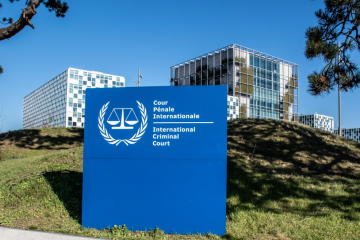
ISRAEL AND IRAN: WHAT NEXT?
With this month’s direct military strikes against each other, a war between Israel and Iran becomes not only conceivable but a growing risk. For all Israel’s advantages and determination, with the most sophisticated military in the region and an innovative and resilient economy, it is a small country of less than ten million people. Iran is a large country of over 80 million people whose economy and military capabilities have survived years of crippling sanctions. The outcome would depend on who had the strongest external support. For the time being, Israel has firm international friends and allies, as Iranian diplomats recognise. But that international support is under strain from the Israeli government’s refusal to consider any negotiations with the Palestinians …

After Gaza: Prospects for a political solution to the conflict
Despite the appalling course of events since 7 October, the continuing fighting and the suffering of the bereaved and displaced in Israel and Gaza, people are beginning to ask where this will all end, how it will end, and even whether it will end? It is essential to address these questions now, because a lasting solution can only be found once people on both sides have some hope for the future The emergence of the two-state solution Since the 1917 Balfour Declaration declared support for a Jewish homeland in Palestine and fuelled the two growing national movements of Jews and the Palestinian Arabs, there have been only three possible solutions to the question of who lives in the land between …

Legal Activism or Ex-Post Justice?
Over Gaza, the international criminal justice system (ICJS), spearheaded by the International Criminal Court (ICC), must pick a trench: Does international criminal justice entail the active involvement in humanitarian relief and prevention in conflict zones? I call those who support this proposition, “legal activists”, for a lack of better terminology. Or might, in contrast, the sole objective of ICJS operations be the realisation of ex-post justice, as “purist” interpreters of international criminal justice usually espouse? This post argues that these two objectives are not mutually exclusive. Instead, I argue that a legal activist approach in situations of acute conflict facilitates ex-post justice in the long run. Gaza, War Crimes, Silence The ICC’s Chief Prosecutor’s Office has been investigating war crime allegations in …

‘Uniting for Peace’ Against Israel’s Annexation Plan
With the diversion of Israel’s military resources towards West Bank, Israeli annexation of occupied Palestinian territory appears imminent, pending approval from and coordination with the American administration. Struggling to rally right-wing voters amidst the fight for his political survival in the elections of April, September 2019 and March 2020, Prime Minister Benjamin Netanyahu had stated that he would “apply Israeli sovereignty” over the West Bank, if re-elected. Bolstered by the reversal of decades of American policy on the issue and the subsequent release of Trump’s much criticized, one-sided ‘Middle East Peace Plan’ in January 2020, Netanyahu has aggressively pursued the annexation agenda with the emergency government formed with Benny Gantz in March 2020. Considering the expected blockage of the Security …

Is Power Sharing a Solution to the Israeli-Palestinian Conflict?
The Israeli general election scheduled for 9th April is widely expected to be followed with the release of what has been termed the ‘Trump peace plan’ for the Israeli-Palestinian conflict. The release of the plan likely rests on the outcome of the election: if Benjamin Netanyahu’s Likud is not returned as the largest party with him as Prime Minister then the status of the plan is uncertain given that the Trump-Netanyahu relationship underpins it. However, who will win the election is far from certain, with the latest polling placing Likud in second place, but suggesting that the right-wing coalition headed by Netanyahu would retain a majority. Given the recent surprise announcement that the United States recognises the Israeli annexation of …

“When is Genocide Permissible?” Never.
Last week Yochanan Gordon posted a blog entry on The Times of Israel’s website entitled “When is Genocide Permissible?” The answer to this question so blatantly obvious that one has to wonder why the question was asked. Indeed, this inaugural post was almost one word long. However, I felt compelled to look at Mr. Gordon’s reasoning given that it has caused such outrage among people on both sides of the conflict. To borrow from J.S. Mill, doing otherwise makes dead dogma out of living truth (Mill, 37). Genocide is obviously evil, but the forensic examination of an argument with which we disagree is the best way to refute it and, hopefully, convince those who hold it to put it aside.

Gaza is Israel’s Munich
In September 1938, European statesmen gathered in Munich for a fateful conference. Hitler wanted to annex the Sudetenland, a German-speaking region of Czechoslovakia; Britain and France, desperate to avoid war with Nazi Germany, caved in and granted the Führer’s request. It was hoped that Hitler’s appetite for territorial expansion would be sated: Neville Chamberlain, Britain’s prime minister, proclaimed that the concession had achieved “peace for our time“. Within a year, Hitler had invaded Poland and the Second World War had begun. The policy of appeasement, it appeared, had failed and forever would fail – or so it came to be thought.
As the twentieth century evolved, ‘appeasement’ evolved into a term of abuse that would automatically discredit the granting of concessions to satisfy an opponent. What had previously referred to the pacific settlement of disputes through pragmatic negotiation, argues historian David Dilks, “came to indicate something sinister, the granting from fear or cowardice of unwarranted concessions in order to buy temporary peace at someone else’s expense”. The spectre of Munich came to hang over every international crisis: the Korea, Vietnam, Falklands and Suez wars were all justified in terms of the inevitable failure of appeasement. Most recently, the willingness of the West to allow Crimea to fall to Russia has been denounced as ‘appeasement’, and it is common to hear the crisis spoken of as ‘Obama’s Munich‘.
The 2005 Gaza Disengagement was Israel’s Munich moment: in Israeli discourse, ‘Gaza’ is to ‘unilateral withdrawal’ what ‘Munich’ is to ‘appeasement’. Israel withdrew its army and 8,000 settlers from Gaza Strip; the power vacuum was soon filled by Hamas, and this densely populated coastal strip became a launching pad for thousands of rockets against Israeli civilian areas, provoking two mini-wars.

Some misperceptions about the Israeli elections
Much has been written about how the media misreported the Israeli elections and I want to briefly dispel two particular misconceptions.
1) The majority of Israelis did not vote against Benjamin Netanyahu. Polls indicate quite clearly that a majority of Israelis wanted to see Netanyahu as Prime Minister. Many voters, though, were opposed to the newly created alliance between his Likud Party and former foreign minister Avigdor Lieberman’s Israel Beyiteinu Party.









